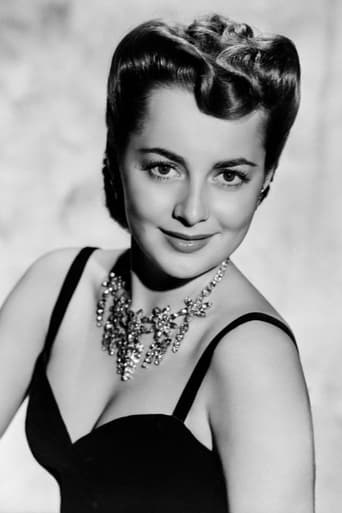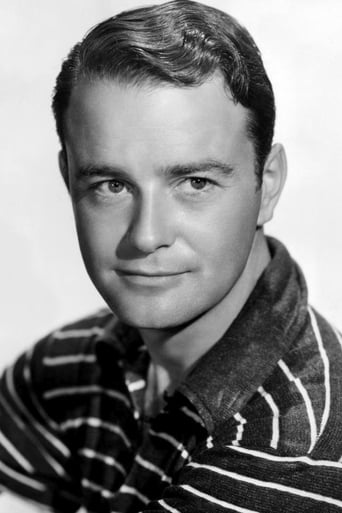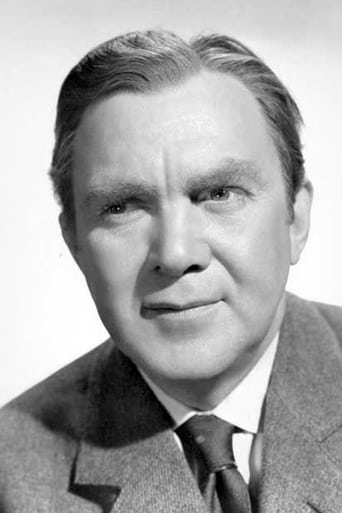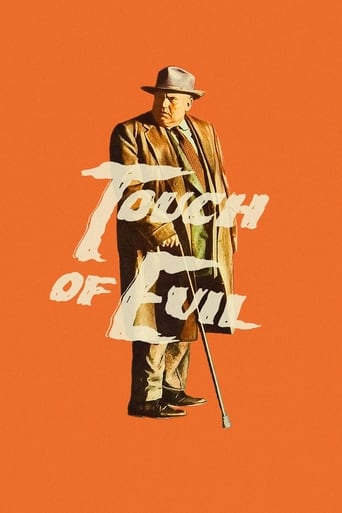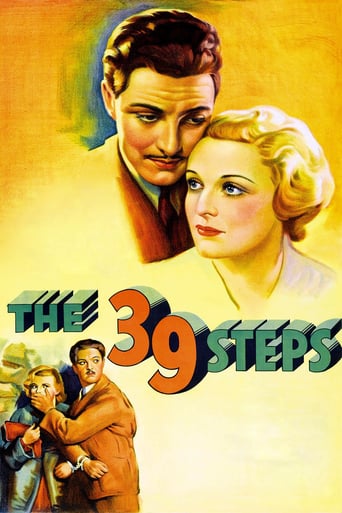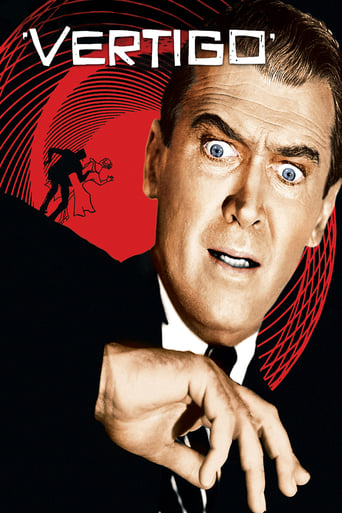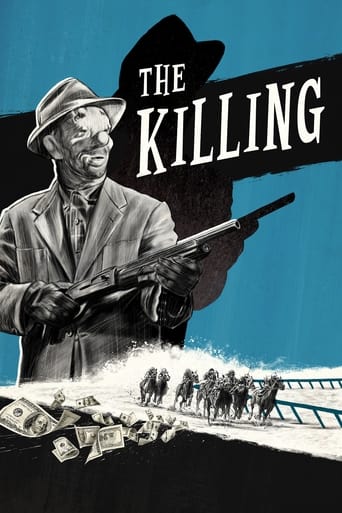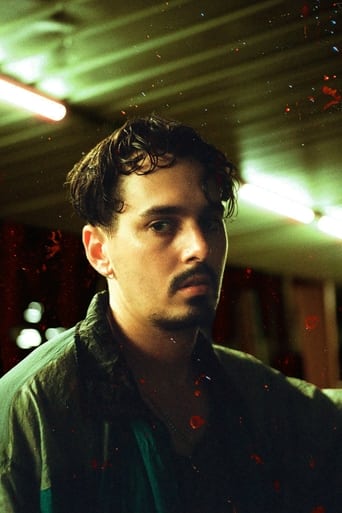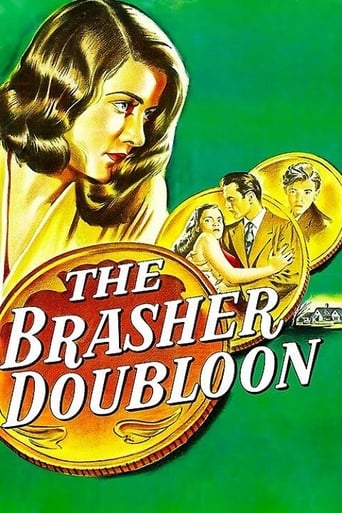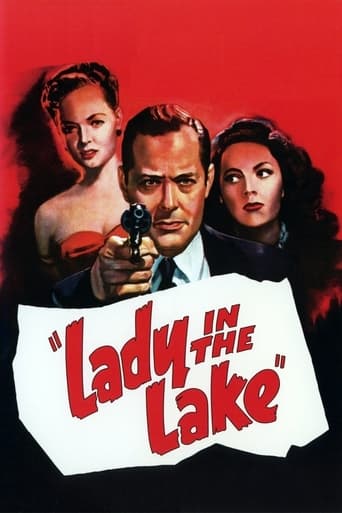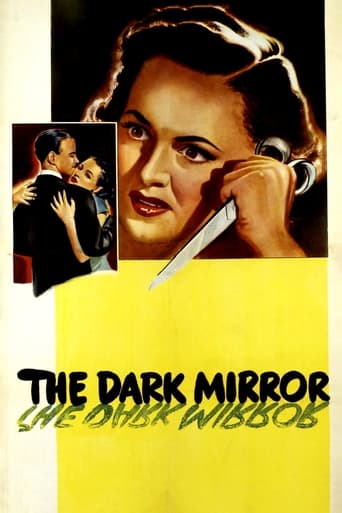
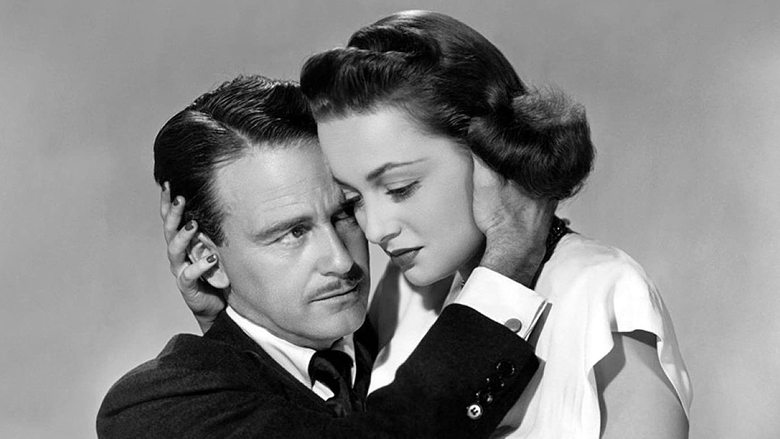
The Dark Mirror (1946)
A sister and her disturbed twin are implicated in a murder and a police detective must figure out which one's the killer.
Watch Trailer
Cast


Similar titles
Reviews
A brilliant film that helped define a genre
Clever, believable, and super fun to watch. It totally has replay value.
The acting is good, and the firecracker script has some excellent ideas.
It is neither dumb nor smart enough to be fun, and spends way too much time with its boring human characters.
There were few directors so suited to the film noir genre as Robert Siodmak, whose lengthy career produced everything from B-movie horrors (Son of Dracula) to exotic adventures (Cobra Woman) and forgotten westerns (Pyramid of the Sun God). However, he is best remembered for his work in the noir genre, which spawned tough, pretension-free crime dramas such as Phantom Lady, Cry of the City and Criss Cross. His movies often employed a kind of gimmick as a hook, with his finest film The Killers jumping back and forth in time to keep the audience guessing. One of Siodmak's lesser-known pulpy efforts, The Dark Mirror, leaned towards psychoanalysis as well as the more familiar sleuthing from a craggy-faced, weather-beaten detective. The advancements in mental health studies was all the rage with many screenwriters during the 1940s, and although much of what is said is utter nonsense, it helps give this lively noir a refreshing edge.Quick-witted detective Lt. Stevenson (Thomas Mitchell) takes on the case of Dr. Frank Peralta, who is found dead in his apartment with a knife in his back. Investigations advance quickly, and after interviewing various witnesses, all the clues points to one woman alone: Peralta's lover Terry Collins (Olivia de Havilland). Many saw her leave the scene shortly after a loud thud was heard from the apartment, and the doctor's appointment book confirms a rendez-vous with the attractive young lady at the time of the murder. Yet when Stevenson corners Terry at her work after various witnesses make a positive identification, she has an alibi that cannot be disputed. Utterly perplexed at the mystery, the veteran dick visits her home to pose a few more questions, only to discover that Terry has, as you probably would have guessed by this point, and identical twin sister, named Ruth. One committed the crime and the other is innocent, but both exercise their right to keep their trap shut to avoid incriminating themselves.Refusing to believe in such a thing as 'the perfect crime', Stevenson brings in Scott Elliott (Lew Ayres), a doctor who frequently encountered both women at their place of work, and who also happens to be an expert in the study of twins. The Dark Mirror doesn't convince when it comes to psychologically evaluating the sisters, but if you can suspend your disbelief and roll with the film's coincidence-reliant plot, this is one of the most engaging noirs the genre has to offer. It's also helped a great deal by the central performance of de Havilland, who takes great delight in playing with the siblings' differing personalities. Their interactions are made even more delightful thanks to some seamless visual effects. The use of clever split-screens make it seem that two different actresses are indeed speaking to one another, putting efforts to recreate the effect as recent as the 1990s completely to shame. There a noticeable tonal issues, particularly with some musical choices heard after Stevenson's wisecracks which grate with the film's darker moments, but The Dark Mirror is yet another of Siodmak's quirky noirs deserving of more recognition.
Psychologist works with the police in determining which of two sisters committed a murder--the trouble is, the ladies are identical twins, with one sibling apparently covering up for the other. Good optical effects and editing can't quite make this scenario convincing, particularly as Olivia de Havilland is wide-eyed and artificial in both her incarnations; the histrionic schlock music rising up in the background doesn't help, either. Director Robert Siodmak's work is hit-and-miss: he handles doctor Lew Ayres' investigation scenes well, however the opening interviews in the police station are awfully corny. Nunnally Johnson adapted his screenplay from an original story by Vladimir Pozner (who alone was Oscar-nominated). The plot builds to a melodramatic boil, yet the final tally isn't all that intriguing. ** from ****
The Dark Mirror is directed by Robert Siodmak and adapted to screenplay by Nunnally Johnson from a story by Vladimir Pozner. It stars Olivia de Havilland, Lew Ayres, Thomas Mitchell, Richard Long and Charles Evans. Music is by Dimitri Tiomkin and cinematography by Milton Krasner.A man appears to have been murdered by one of the identical twin Collins sisters, but both of whom have an alibi. The police and the psychiatrist have their work cut out...Straight out of the corner of postwar Hollywood that began to take fascination with mental illness, The Dark Mirror triumphs more as a technical exercise than as anything resembling thought provoking analysis. The simplistic Freudian elements aside, film is impressively mounted and performed by Siodmak and de Havilland respectively. Story follows the trajectory of a cat-and-mouse game, with the makers nicely putting us the viewers into the same struggle the authorities have in sussing out which sister is the damaged killer.Siodmak's (The Spiral Staircase) attention to detail and grasp of mood setting really lifts the piece to greater heights. Aided by the considerable photographic skills of Krasner (The Set-Up), Siodmak creates a world of psychological disturbance, a place aligned with suspense and symbolism. Right from the doozy of an opening scene to the denouement, Siodmak manages to keep the contrivances to the rear of the play and let de Havilland and the visual textures be the prime focus.The effects work is very good, with de Havilland having to quite often play off against herself. Sure in today's age of High Definition et al, you don't have to stretch your viewing experience to see how the effects were done, but why would you? Just enjoy de Havillland's riveting performances in the dual roles (see also her excellence in The Snake Pit two years later), her skillful little subtleties as she deftly plays out the respective psychological traits of sibling rivalry gone astray.Is it a gimmick movie? Well no not really, it's honest about what it wants to achieve in terms of psychiatric observations and treatments. Yet lesser lights than Siodmak, Krasner and de Havilland would have struggled to make it work, especially as the romance angle in the screenplay nearly derails the requisite mood come the finale. Thankfully, in spite of some obvious negatives, it's still well worthy of viewing investment. 7/10
A blend of suspense and dark romance, The Dark Mirror is a well acted film which at most showcases the impressive acting ability of Olivia De Havilland.Starting as a darkly atmospheric piece after a murder is committed, the investigation quickly moves onto a suspect named Collins, a woman who was a known associate of the murder victim. However the apparently simple investigation goes into a tailspin when it's revealed Collins is one half of identical twins. It must have been a daunting task as a performer to take on the roles of protagonist and antagonist in the same film yet Olivia De Havilland pulls it off to great conviction. Playing the parts of Terry, a cunning and manipulative psychopath and Terry's twin Ruth, a shy and more naive woman. By changing her mannerisms, vocal tone and demeanour for both roles De Havilland showed to spectacular range of her acting ability.Although the acting on show by De Havilland and others in The Dark Mirror was top standard, the same cannot be said for the narrative. It starts off well with the dilemma of identical twins causing The Dark Mirror to become a gripping mysterious piece along with the wise cracking dialogue between Detective Stevenson and Terry adding to the film's aura. Yet when the narrative shifts from thriller to dark romance with the introduction of Doctor Elliot, a man who falls for Ruth yet bitters Terry into jealously, The Dark Mirror becomes tedious due to its predictability. Although the acting throughout the romantic portion of the narrative makes for emotional involvement it also makes the actions of Terry, Ruth and Doctor Elliot predictable resulting in being able to know the narrative's outcome before its reached.On a lighter note The Dark Mirror has a good amount of comic relief served up by Thomas Mitchell as Detective Stevenson, whose wise cracks create breathing space from the drama and earlier on has great chemistry with De Havilland as her more sinister character. Unfortunately this tense relationship is under developed due to relatively small role Mitchell plays here. The comic relief also comes in the revelation of Collins being an identical twin particularly for the witnesses who are dazed by this fact resulting in a few laughs on the audience's part.Although story wise The Dark Mirror is not the most superb of films, it does not get in the way of the fine acting on display which for a time entices us into the narrative.


